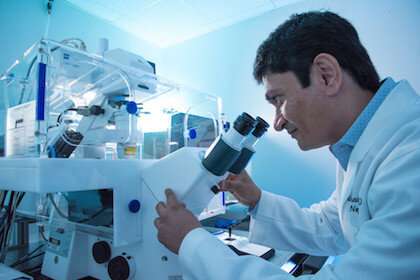Medical Scientists Discover Treatment For Polycystic Kidney Disease, An Incurable Fatal Kidney Disease
Source:Thailand Medical News Sep 13, 2019 6 years, 4 months, 3 days, 21 hours, 5 minutes ago
Researchers from the University Of Texas Southwestern Medical Center have developed a potential treatment for polycystic kidney disease, a genetic disorder that causes the kidneys to swell with multiple cysts and eventually lead to organ failure. To date there has been no possible treatments for this disease until this latest development.

Dr Vishal Patel Photo Credit: UTSW
The research and study shows an approximately 50 percent reduction in kidney size in afflicted animal models following treatment. The drug is now in early clinical trials in human subjects according to Dr.Vishal Patel, Associate Professor of Internal Medicine at UT Southwestern and lead researcher.
Autosomal dominant polycystic kidney disease (ADPKD) affects about 14.5 million people worldwide, with half developing end-stage kidney disease by age 60.
Assoc Prof Vishal Patel commented in exclusive interview with Thailand Medical News "Once the kidneys have failed, the only options for survival are dialysis or a kidney transplant. "A large percentage of ADPKD patients on dialysis die each year while waiting for a donated kidney."
The only drug currently approved to treat ADPKD, called Tolvaptan (Jynarque ) carries the US FDA's highest warning in its prescribing information notifying prescribers and users of the possibility of "serious and potentially fatal liver injury."Very few patients have been on this drug as newer studies have shown that most patients on it succumbs to liver disease and die even faster with the complications.
The new developed treatment protocol cooperatively developed at UT Southwestern and Regulus Therapeutics Inc., a biopharmaceutical company based in California, showed no evidence of toxicity in animals or in human cell tests, according to the study. It is preferentially delivered to kidneys rather than the liver after being administered.
Dr Patel further commented,"We earlier showed that levels of a tiny RNA fragment called microRNA-17 are increased in models of ADPKD. MicroRNA-17 interferes with the normal function of other, beneficial RNAs, causing kidney cysts to grow. RGLS4326, as the new drug is called in development, works by blocking the harmful microRNA-17."
Early phase one human clinical trials began in late 2018, conducted by Regulus Therapeutics. The FDA has asked for additional toxicity information from animal testing before human trials can move to the next step. The second stage of the clinical trials are expected to start in November 2019. So far the studies are already showing that it’s a promising drug in the making.
Reference: Edmund C. Lee et al, Discovery and preclinical evaluation of anti-miR-17 oligonucleotide RGLS4326 for the treatment of polycystic kidney disease,
Nature Communications (2019).
DOI: 10.1038/s41467-019-11918-y
